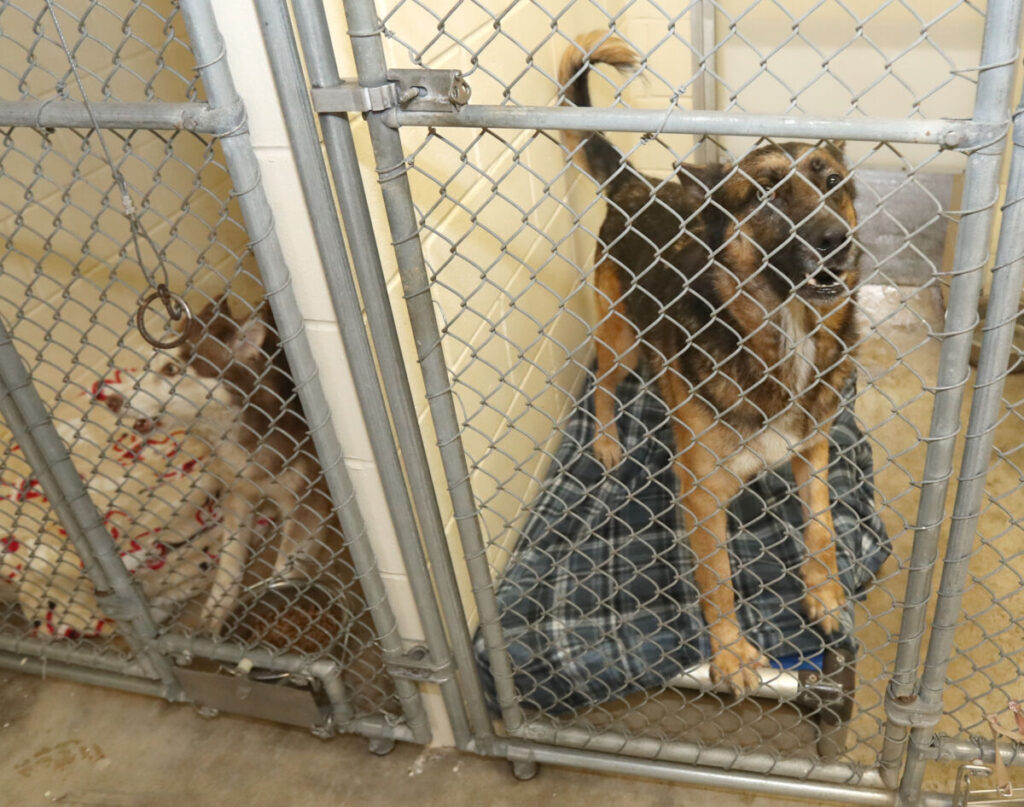Ocala seeks to enhance animal control services it receives from Marion County

File photo: Two of the 37 dogs that were seized and were all being kept at the Marion County Animal Center look out of their kennels on Southeast 66th Street in Ocala on Tuesday, Jan. 25, 2022. [Bruce Ackerman/Ocala Gazette] 2022.
The Ocala City Council has come to a consensus on continuing to receive animal control services from Marion County under a revised interlocal agreement that includes enhanced services for city residents.
Last year, the county informed the city that the 2009 interlocal agreement that originally transferred animal control services to Marion County needed to be renegotiated due to rising costs of the county department’s operations, particularly as it related to operating a no-kill shelter.
In order to address concerns that the county department was not responding to resident calls on a timely basis, the county has agreed to allocate two animal control officers exclusively to handle service calls within the city limits at an additional cost to the city.
The council unanimously approved the proposed contract changes during its April 18 meeting. The modified agreement now goes to the Marion County Board of County Commissioners, which is expected to review the terms in the coming weeks.
The city will compensate the county for the services annually for a sum that equals 10% of the county’s budget for “Animal Control Services,” as well as the cost of the two animal control officers and their vehicles.
The city’s first payment to the county under its existing budget projection is $185,747, in addition to the employees’ salaries and operational costs of $173,416 and the vehicles and other utilities they require are expected to use that cost approximately $140,628.
Council Member Kristen Dreyer noted the revised agreement lacks written language detailing that those city-bought vehicles revert back to Ocala if the agreement is terminated. She requested added language requiring Marion County to return city-funded equipment upon terminating the agreement within five years.
The county also must also track GPS locations on those vehicles and maintain call history data to be readily available to the city and the public.
Locked In
Council Member Jay Musleh questioned if the city would be “locked in” to the contract and required to pay fees even if service expectations were not met. “Probably every contract we’ve signed has some sort of out provision or cancellation clause if services or product is not delivered,” he said.
Assistant City Manager Ken Whitehead said the contract has an 18-month written notice termination option if either party wishes to enact it, but that action cannot precede September 2027.
City Attorney William Sexton also pointed out that Section 10 allows the city a timelier solution with a 30-day notice that service expectations and obligations failed to be met. A dispute resolution section allows either party to submit an unresolved problem for mediation.
Musleh asked if the council would have any “teeth” in the contract dispute section.
“It’s the enhanced animal control service that the city is asking for in that section of the agreement,” Sexton replied. “That really is where we would have the ‘teeth’ that I think Councilman Musleh is talking about for more closely analyzing what (the county) is providing and then determining whether they are in default.”
The county’s calls for service are prioritized by level and time of response to the scene. However, historically the county has had difficulty fully staffing this department, which in turn handicaps its ability to always respond timely to resident complaints.
The county’s calls for service are prioritized by level and time of response to the scene.
Here is how the county currently prioritizes animal control calls:
Level 1 includes a threat to safety where the public or an animal is in distress and is responded to immediately.
Level 2 response urgently follows the prior level and cases include animal injury, sale, and containment.
Level 3 is deemed a same-day response once the first levels are handled, including abandonments and sick or injured animals not within a public zone.
In 24 hours, Level 4 is addressed with the services of animals not in eminent danger but facing cruelty and animal attacks not in progress.
The latest reacted response is Level 5, where in 72 hours barking, stray, and vaccination calls are answered.
Public criticism
Resident Brian Creekbaum, a frequent critic of the county’s animal control services, addressed several complaints to the council.
“(The agreement) is an abdication of city council’s responsibility for making laws for the city of Ocala to county commissioners, who are not elected under our city charter,” he said.
He said the city has no control over the quality of personnel the county supplies for services and no set goals in the agreement for measuring performance. “There are lots of ways that they can screw this up and make us really unhappy without being technically in default under this agreement,” he said.
“Entering an agreement that locks the city in for at least five years is foolish and probably has more to do with kicking the issue past the retirement of the assistant city manager than anything a rational person would do with an underperforming vendor,” Creekbaum said.
He said when the city was in control of animal services, actions simple as “rescuing cats from trees” were taken. He questioned whether the county will provide the same level of service.
Creekbaum shared a personal experience of seeing a stray German shepherd on the south side of U.S. 27. He said if the dog is not causing physical harm, the county will not respond.
“What does this interlocal do for that dog?” Creekbaum asked. “Absolutely nothing.”
He concluded by saying, “To get a satisfactory resolution on this, some people in this room are gonna have to be replaced.” No one on the council responded to his comments.





